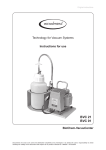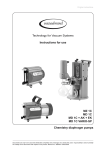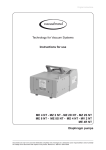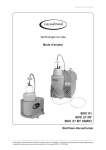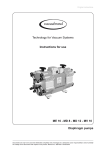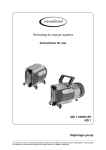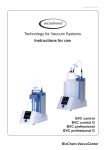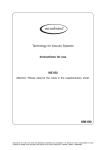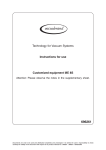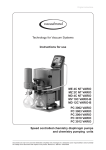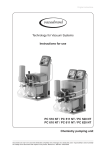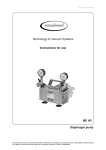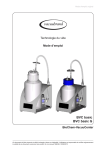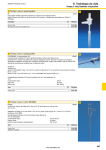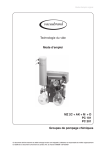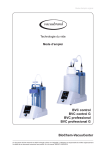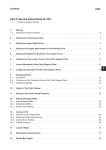Download - Vacuubrand.com
Transcript
page 1 of 31 Technology for Vacuum Systems Instructions for use BVC 01 BVC 21 NT BVC 21 NT VARIO BioChem-VacuuCenter Documents are only to be used and distributed completely and unchanged. It is strictly the users´ responsibility to check carefully the validity of this document with respect to his product. Manual-no.: 999157 / 10/12/2009 page 2 of 31 Dear customer, Your VACUUBRAND diaphragm pumps should support you for a long time without trouble and with maximal power. Thanks to our long practical experience we have much information how you could ensure powerful application and personal safety. Please read these instructions for use before the initial operation of your pump. VACUUBRAND diaphragm pumps are the result of many years of experience in construction and practical operation of these pumps combined with the latest developments in material and manufacturing technology. Our quality maxim is the ”zero fault principle”: Every diaphragm pump, leaving our company, is tested intensively including an endurance run of 18 hours. Therefore also faults, which occur rarely, are identified and can be eliminated immediately. The achievement of the specifications after the endurance run is tested for every pump. Every VACUUBRAND pump achieves the specifications. We feel obliged to this high quality standard. We know that the vacuum pump can not take a part of your real work and hope that our products contribute to an effective and trouble-free realisation of your work. Yours VACUUBRAND GMBH + CO KG After sales service: Contact your local dealer or call +49 9342 808-193 ➨ Danger! Immediate danger. Death or severe injuries as well as damage to equipment and environment can occur. NOTICE ☞ Warning! Possible danger. Severe injuries as well as damage to equipment and environment can occur. • Caution! Possible danger. Slight injuries as well as damage to equipment and environment can occur. Note. Disregarding of notes may cause damage to the product. Caution! Hot surface! Isolate equipment from mains before removing the cover. Documents are only to be used and distributed completely and unchanged. It is strictly the users´ responsibility to check carefully the validity of this document with respect to his product. Manual-no.: 999157 / 10/12/2009 page 3 of 31 Contents Safety information!......................................................................................................4 General information.............................................................................................................................4 Intended use........................................................................................................................................4 Setting up and installing the system....................................................................................................4 Ambient conditions..............................................................................................................................5 Operating conditions...........................................................................................................................5 Safety during operation.......................................................................................................................6 Maintenance and repair.......................................................................................................................8 Technical data..............................................................................................................9 Wetted materials..............................................................................................................................10 System parts.................................................................................................................................... 11 Use and operation....................................................................................................13 Installation.........................................................................................................................................13 During operation................................................................................................................................13 Shutdown..........................................................................................................................................15 VacuuHandControl VHC...................................................................................................................16 Accessories - spare parts.........................................................................................18 Troubleshooting........................................................................................................19 Replacing diaphragms and valves..........................................................................20 Removing cover hood from base plate.............................................................................................21 Cleaning and inspecting the pump head..........................................................................................21 Replacing the diaphragm.................................................................................................................23 Assembling the pump head..............................................................................................................24 Assembling the connecting hoses....................................................................................................24 Mounting the cover hood..................................................................................................................25 Replacing the fuse............................................................................................................................25 Assembling of components.....................................................................................26 Replacing the aspiration tube at the VHC........................................................................................26 Replacing the filter............................................................................................................................26 Assembling a second connection set VHC.......................................................................................26 Cleaning and decontaminating................................................................................27 Notes on return to the factory..................................................................................28 Health and safety clearance form............................................................................29 Documents are only to be used and distributed completely and unchanged. It is strictly the users´ responsibility to check carefully the validity of this document with respect to his product. Manual-no.: 999157 / 10/12/2009 page 4 of 31 Safety information! General information ☞ Before operating the equipment read and comply with the section ”Cleaning and decontamination”! NOTICE ☞ Read and comply with this manual before installing or operating the equipment. ☞ Lift and transport the equipment at the provided handles and/or recessed grips. ☞ It is imperative to remove the transportation lock at the underside of the equipment prior to use (BVC 21 NT / BVC 21 NT VARIO)! Keep the locking screws and install again prior to further transportation! Remove all packing material, remove the product from its packing-box, remove the protective covers from the inlet and outlet ports and keep, inspect the equipment. If the equipment is damaged, notify the supplier and the carrier in writing within three days; state the item number of the product together with the order number and the supplier’s invoice number. Retain all packing material for inspection. Do not use the equipment if it is damaged. If the equipment is not used immediately, replace the protective covers. Store the equipment in suitable conditions. Intended use + The system and all system parts are not to be used on humans or animals. + Prevent any part of the human body from coming in contact with the vacuum. ☞ Make sure that the individual components are only connected, combined and operated according to their design and as indicated in the instructions for use. Use only original VACUUBRAND accessories. ☞ Comply with notes on correct vacuum and electrical connections, see section ”Use and operation”. • The systems are designed for ambient temperatures during operation between +10°C and +40°C. Check the maximum temperatures if installing the system in a cabinet or a housing and make sure ventilation is adequate. Install an external automatic ventilation system if necessary. NOTICE Ensure that the equipment and all components are suitable for the intended application. Use the system only for aspiration of liquids. Setting up and installing the system ➨ Equipment must be connected only to a suitable electrical supply and a suitable earth point. Failure to connect the motor to ground may result in deadly electrical shock. The supply cable may be fitted with a moulded European IEC plug or a plug suitable for your local electrical supply. If the plug has been removed or has to be removed, the cable will contain wires colour coded as follows: green or green and yellow: earth; blue or white: neutral; brown or black: live. The devices BVC 01 and BVC 21 NT have to be protected by an external fuse according to their current draw (cf ”Technical data”). The BVC 21 NT VARIO has an internal fuse. Documents are only to be used and distributed completely and unchanged. It is strictly the users´ responsibility to check carefully the validity of this document with respect to his product. Manual-no.: 999157 / 10/12/2009 page 5 of 31 ☞ Do not permit any uncontrolled pressurizing (e.g. make sure that an exhaust pipeline cannot become blocked). Risk of bursting! ☞ Due to the high compression ratio of the pumps, pressure at the outlet port might be generated being higher than the maximum permissible pressure compatible with the mechanical stability of the system. ☞ Always provide a free and pressureless exhaust pipeline. • Comply with maximum permissible pressures and pressure differences, see section ”Technical data”. Do not operate the pumping unit with overpressure at the inlet or outlet. • Check that mains voltage and current conform with the equipment (see rating plate). • Avoid overpressure of more than 0.2 bar in case inert gas is connected. NOTICE Provide a firm level platform for the equipment. Ensure a stable position of the pump without any mechanical contact except of the pump feet. Comply with all applicable safety regulations. Install an external automatic ventilation system if necessary. Keep a distance of minimum 20 cm between fan and ambient parts (e.g. housing, walls, ...). Check fan regularly for dust/dirt, clean if necessary to avoid a cutback of ventilation. Avoid high heat supply (e. g. due to hot process gases). If the equipment is brought from cold environment into a room for operation, allow the equipment to warm up (pay attention to water condensation on cold surfaces). The diameter of the an outlet pipeline should be at the least as large as the diameter of the pump connections. Comply with all applicable and relevant safety requirements (regulations and guidelines), implement the required actions and adopt suitable safety measures. For aspiration of liquids connect the system BVC 01 to a suitable vacuum supply. Ambient conditions NOTICE To the best of our knowledge the equipment is in compliance with the requirements of the applicable EC-directives and harmonized standards (see ”Declaration of conformity”) with regard to design, type and model, especially directive IEC 1010. This directive gives in detail conditions, under which the equipment can be operated safely (see also IP degree of protection). Adopt suitable measures in case of differences, e. g. using the equipment outdoors, installation in altitudes of more than 1000 m above mean sea level, conductive pollution or bedewing. Pay attention to the permissible maximum ambient temperatures (see ”Technical data”). Operating conditions ➨ The devices have no approval for operation in or for pumping of potentially explosive atmospheres. Documents are only to be used and distributed completely and unchanged. It is strictly the users´ responsibility to check carefully the validity of this document with respect to his product. Manual-no.: 999157 / 10/12/2009 page 6 of 31 ➨ The devices are not suitable to pump - unstable substances and substances which react explosively under impact (mechanical stress) and/or when being exposed to elevated temperatures without air, - self inflammable substances, - substances which are inflammable without air and - explosive substance • The devices are not suitable for pumping substances which may form deposits inside the pump. Deposits and condensate in the pump may lead to increased temperatures even to the point of excessing the maximum permitted temperatures! Increased temperatures may cause ignition of inflammable substances being eventually inside the pump. • If there is a danger of the formation of deposits in the pump chamber (check inlet and outlet of the pump), inspect the pump chamber regularly and clean if necessary. • The pumps are not suitable for pumping dust and have no approval for operation below ground. NOTICE If pumping different substances, it is recommended to purge the pump with air or inert gas prior to changing the pumped media in order to pump out residues and to avoid reactions of the pumped substances with each other and with the pump materials. Take into consideration interactions and chemical reactions of the pumped media. Ensure that the materials of the wetted parts are compatible with the pumped substances, see section ”Technical data”. Safety during operation ➨ Adopt suitable measures to prevent the release of dangerous, toxic, explosive, corrosive, noxious or polluting fluids, vapours and gases. In case install an appropriate collecting and disposal system and take protective action for pump and environment. ➨ If the equipment is used in combination with hazardous materials (e. g. in medical-microbiological laboratories) check all relevant safety and health requirements and determine the applicability of regulatory limitations prior to use if necessary. ➨ Prevent any part of the human body from coming in contact with the vacuum. ➨ Use appropriate safety work materials and methods if necessary, e. g. steam sterilization, sterilization indicators or germicides. Notes concerning the sterilization of wetted parts (see ”Technical data”) see section ”Cleaning and decontaminating”. It is the user´s responsibility to ensure effective sterilization. ➨The user must take suitable precautions to prevent any formation of explosive mixtures in the expansion chamber or in the housing. In case of e.g. a diaphragm crack, mechanically generated sparks, hot surfaces or static electricity may ignite these mixtures. Use inert gas for venting if necessary. ➨ Potentially explosive mixtures at the outlet of the pump have to be drained appropriately, sucked off or diluted with inert gas to non-explosive mixtures. ☞ Pay attention to the symbol ”hot surfaces” on the equipment. Adopt suitable measures to prevent any danger arising from hot surfaces. Allow pump to cool down before starting maintenance. Documents are only to be used and distributed completely and unchanged. It is strictly the users´ responsibility to check carefully the validity of this document with respect to his product. Manual-no.: 999157 / 10/12/2009 page 7 of 31 • Use the system only in combination with the integrated hydrophobic filter (sterilizable) to protect pump and environment (people). • Comply with applicable regulations when disposing of chemicals. Take into consideration that chemicals may be polluted.Take adequate precautions to protect people from the effects of dangerous substances (chemicals, thermal decomposition products of fluoroelastomers), wear appropriate safety-clothing and safety glasses. • Never operate a defective or damaged device. • Check the collecting bottle regularly for fissures. Do never use a collecting bottle with fissures nor expose it to vacuum. • Use only OEM spare parts and accessories. Otherwise safety and performance of the equipment as well as the electromagnetic compatibility of the equipment might be reduced. Possibly the CE mark or the cTÜVus mark (see rating plate) become void if not using OEM spare parts NOTICE Ensure that in case of failure the system always will turn into a safe status. Provide appropriate protective measures (i.e precautions which allow for the requirements of the respective application) even for the case of failure and malfunction. Operating the pump, stand still of the pump or venting must not lead to a critical dangerous situation under any circumstances. Electronic equipment is never 100% fail-safe. This may lead to an indefinite status of the equipment. Failure of the pumping unit (e. g. by power failure) or connected components, parts of the supply or change of parameters must not lead to a critical dangerous situation under any circumstances. In case of diaphragm cracks or leaks in the manifold pumped substances might be released into the environment or into the pump housing. Comply especially with notes on operation and use and maintenance. Maximum liquid level in collecting bottle: approx. 80 %, depending on the application (in case of low boiling liquids or in case of suction of liquids which tend to foam, the maximum liquid level might be reduced). Due to the residual leak rate of the equipment, there may be an exchange of gas, albeit extremely slight, between the environment and the vacuum system. Adopt suitable measures to prevent contamination of the pumped substances or the environment. In case of overload the motor is shut down by a self-hold thermal cutout in the winding. Attention: Reset possible only manually. Switch off the pump or isolate the equipment from mains. Identify and eliminate the cause of failure. Wait approx. five minutes before restarting the pump. Attention: In case of supply voltage below 100V, the lock of the cutout might be restricted and the pump might restart on its own after sufficient cooling down. Take suitable precautions, if an automatic restart of the pump may lead to a critical dangerous situation. The A-weighed emission sound pressure level of the pump does not exceed 70 dB(A). Measurement according to EN ISO 2151:2004 and EN ISO 3744:1995 with standard silencer or exhaust tube at outlet. Documents are only to be used and distributed completely and unchanged. It is strictly the users´ responsibility to check carefully the validity of this document with respect to his product. Manual-no.: 999157 / 10/12/2009 page 8 of 31 Maintenance and repair NOTICE Wear parts have to be replaced regularly. In case of normal wear the lifetime of the diaphragms and valves is > 10000 operating hours. Bearings have a typical durability of 40000 h. Motor capacitors have a typical durability in the range of 10000 to 40000 h depending strongly on the operation conditions like ambient temperature, humidity or load. • Check every motor capacitor regularly by measuring its capacity and estimating its operation time. Exchange old capacitors early enough to prevent a failure. If an overaged motor capacitor fails it might get hot and even melt and may cause a flame to form which could be dangerous for persons and equipment in the vicinity. Motor capacitors have to be replaced by an electrician. ➨ Before starting maintenance vent the system, switch off the device and isolate the equipment from the electrical supply. Isolate equipment from mains before removing the cover! ➨ Before starting maintenance, isolate the equipment from mains and wait two minutes to allow the capacitors to discharge. ☞ Ensure that the pump cannot be operated accidentally. Never operate the pump if covers or other parts of the pump are disassembled. Never operate a defective or damaged pump. ☞ Attention: The pump might be contaminated with noxious or otherwise dangerous process chemicals that have been pumped during operation. Ensure that the pump is decontaminated before maintenance and take adequate precautions to protect people from the effects of dangerous substances if contamination has occurred. Wear appropriate safety-clothing when you come in contact with contaminated components. • Before starting maintenance vent the system and allow sufficient cooling of the pump. • Drain condensate, if applicable. Avoid the release of pollutants. Ensure that maintenance is done only by suitably trained and supervised technicians. Ensure that the maintenance technician is familiar with the safety procedures which relate to the products processed by the pumping system. In order to comply with law (occupational, health and safety regulations, safety at work law and regulations for environmental protection) vacuum pumps, components and measuring instruments returned to the manufacturer can be repaired only when certain procedures (see section ”Notes on return to the factory”) are followed. Documents are only to be used and distributed completely and unchanged. It is strictly the users´ responsibility to check carefully the validity of this document with respect to his product. Manual-no.: 999157 / 10/12/2009 page 9 of 31 Technical data Type BVC 21 NT VARIO BVC 21 NT BVC 01 Pump Pump Valve Maximum pumping speed (ISO 21360) m3/h 2.2 1.9/2.2* - Ultimate vacuum (absolute) mbar 100 150 - 0.09 0.12 0.03 Maximum permissible inlet pressure (absolute) bar 1.1 Maximum permissible outlet pressure (absolute) bar 1.1 Rated power kW No-load speed min-1 0-1800 1500/1800* - Control range mbar 100 - atmosphere - - Permissible ambient temperature storage / operation °C -10 to +60 / +10 to +40 Permissible relative atmospheric moisture during operation (no condensation) % 30 to 85 Maximum permissible range of supply voltage Attention: Observe specifications of rating plate! Rated current at: 100-120 V~ 50/60 Hz 230 V~ 50/60 Hz 100-120 V~ +5%/-10% 50/60 Hz 230 V~ ±10% 50/60 Hz A A 2 (maximum) 0.9 (maximum) 2.6 / 2.6 1.1 / 1.1 - Internal fuse 4A SPT 5x20 - - Motor protection thermal cutout, manual reset Degree of protection IEC 529 Volume of collecting bottle Adapter for VHC IP 20 IP 20 - System System System 4 4 4 pasteur pipettes, capillaries, pipette tips (100 µl) Outlet hose nozzle DN 10 mm Hydrophobic filter Type Manufacturer Nominal pore diameter Weight approx. hose nozzle DN 6/10 mm Midisart® 2000 Sartorius 0.2 Degree of protection IEC 529 Dimensions L x W x H approx. - mm kg IP 20 IP 20 IP 52 275 x 450 x 520 275 x 450 x 520 300 x 255 x 500 14.5 12.2 4 * at 50/60 Hz We reserve the right for technical modifications without prior notice! Documents are only to be used and distributed completely and unchanged. It is strictly the users´ responsibility to check carefully the validity of this document with respect to his product. Manual-no.: 999157 / 10/12/2009 page 10 of 31 Wetted materials Components Wetted materials Pump Head cover ETFE carbon fibre reinforced Housing cover insert PTFE carbon reinforced Diaphragm clamping disc ETFE carbon fibre reinforced Diaphragm PTFE Valve (BVC 21 NT) PTFE Valve (BVC 21 NT VARIO) FFKM Fittings ETFE / ECTFE System Pressure switch (BVC 01 / BVC 21 NT) PA, FPM Sensor housing (BVC 21 NT VARIO) stainless steel Sensor (BVC 12 NT VARIO) aluminium oxide ceramic O-ring (Sensor BVC 21 NT VARIO) fluoroelastomer Seal ring PVC, FPM Orifice PET Hose connections to pump head PTFE, PVC Hose connection (outlet BVC 21 NT) ETFE / ECTFE Hose nozzle (outlet BVC 01) PPS glass fibre reinforced Separator PP Separator cover plate PP Collecting bottle VTC Bottle PP Screw cap PP Hose nozzle at screw cap PPS Tube inside the bottle PE Tube between bottle and pump PVC Blind cap PPS glass fibre reinforced Coupling PP, stainless steel, EPDM Filter Diaphragm PTFE Housing PP Aspiration controller VHC Hose silicone caoutchouc Adapter PVC or PP We reserve the right for technical modifications without prior notice! Documents are only to be used and distributed completely and unchanged. It is strictly the users´ responsibility to check carefully the validity of this document with respect to his product. Manual-no.: 999157 / 10/12/2009 page 11 of 31 System parts BioChem-VacuuCenter BVC 21 NT / BVC 21 NT VARIO (fig.: BVC 21 NT VARIO) filter connecting tube inlet diaphragm pump with coupling (double sided sealed if removed) blind cap (for further connections) VHC screw cap coupling collecting bottle recessed grip adjusting knob for vacuum control (only BVC 21 NT VARIO) Rear view: rating plate handle outlet separator mains connection On/off switch ➨ Connect the tube of the VacuuHandControl VHC to the hose nozzle of the coupling of the bottle head. ➨ Assemble the connecting tube with filter. Documents are only to be used and distributed completely and unchanged. It is strictly the users´ responsibility to check carefully the validity of this document with respect to his product. Manual-no.: 999157 / 10/12/2009 page 12 of 31 BioChem-VacuuCenter BVC 01 connecting tube filter blind cap (for further connections) coupling (connection VHC) screw cap collecting bottle pressure control device inlet isolation valve with coupling (double-sidedly sealed if removed) solenoid operated isolation valve hose nozzle (connection to vacuum supply) ➨ Assemble the screw cap with filter and connecting tube. ➨ Connect the tube of the VacuuHandControl to the hose nozzle of the coupling at the bottle head. VacuuHandControl VHC fixing clip thumb wheel control button adapter aspiration tube locking ring handle Documents are only to be used and distributed completely and unchanged. It is strictly the users´ responsibility to check carefully the validity of this document with respect to his product. Manual-no.: 999157 / 10/12/2009 page 13 of 31 Use and operation Installation • It is imperative to remove the transportation lock prior to use! Tilt device carefully onto the side. Remove the four locking screws (wing screws) next to the fan guard at the base plate. Put device back to normal operating position and keep the locking screws. • Make sure ventilation is adequate if equipment is installed in a housing or if ambient temperature is elevated. Keep a distance of minimum 20 cm between fans or ventilation slots and ambient parts. • Before switching on the equipment check that mains voltage and current conform with the equipment! NOTICE Remove the protective foils from the fittings at the flask head and in case the protective covers from the inlet of the diaphragm pump, the solenoid operated valve (BVC 01) or the collecting bottle. Assemble the connecting tube with filter between the bottle head and the inlet of the diaphragm pump (BVC 21 NT / BVC 21 NT VARIO) or the inlet of the solenoid operated valve (BVC 01). Connect the aspiration tube of the VacuuHandControl VHC to the coupling at the bottle head. Connect the mains cable at the rear of the device (BVC 21 NT / BVC 21 NT VARIO) or plug the mains cable into the pressure control device (BVC 01). Plug the IEC socket of the solenoid operated valve (BVC 01) into the pressure control device. If the pump is installed in altitudes of more than 1000 m above mean sea level check compatibility with applicable safety requirements (motor may overheat due to insufficient cooling). The device BVC 21 NT VARIO features an internal fuse under the cover hood. See section ”Replacing diaphragms and valves” when removing the cover hood to check/ replace the fuse. During operation • • NOTICE Maximum ambient temperature: 40 °C Operate the system only with the integrated hydrophobic filter. Protection of the pump against liquids and contamination. Protection of the environment/user against contamination (risk of infection!). The VHC allows the aspiration of excess liquids. See section ”VacuuHandControl VHC” for operation method. The pump achieves its pumping speed, ultimate vacuum and vapour pumping rate only at operating temperature (after approx. 15 minutes). Prevent internal condensation, transfer of liquids or dust. The diaphragm and valves will be damaged, if liquids are transferred through the pump in significant amounts. In case of excess temperature the motor is shut down by a thermal cutout in the winding. Manual reset is necessary. Switch off the pump or isolate the equipment from mains. Identify cause of failure and eliminate. Wait approx. five minutes before restarting the pump. Documents are only to be used and distributed completely and unchanged. It is strictly the users´ responsibility to check carefully the validity of this document with respect to his product. Manual-no.: 999157 / 10/12/2009 page 14 of 31 Attention: In case of supply voltage below 100V, the lock of the cutout might be restricted and the pump might restart on its own after sufficient cooling down. Take suitable precautions, if an automatic restart of the pump may lead to a critical dangerous situation. After a power cut the system will automatically start again. BVC 21 NT: The vacuum pump operates at constant speed and is switched by an automatic pressure control as necessary. Thus the collecting bottle provides the necessary vacuum for the next aspirations. Avoid too frequent switching (> 5 switch points per minute) of the vacuum pump (e.g. due to air intake). BVC 21 NT VARIO: The vacuum inside the collecting bottle can be controlled with the adjusting knob (VACUUM) at the front of the device. When turning the knob to the left (”+”, more vacuum), the diaphragm pump provides a lower pressure inside the collecting bottle. The suction power is increased. If the adjusting knob is turned to the right (”-”, less vacuum), the pump provides less vacuum inside the bottle. The speed of the pump is adapted via an internal control to the respective vacuum demand. There is no abrupt switching of the pump. If the demanded vacuum level inside the bottle is reached, the pump reduces its speed down to standstill. Attention: If the adjusting knob is turned completely to the left or close to the stop at the left (in direction ”+”, more vacuum), the vacuum demand might be below the ultimate vacuum of the diaphragm pump. Thus the pump will run continuously at highest speed. To avoid this mode of operation, reduce the vacuum demand slightly. The vacuum pump will then reduce its speed automatically down to standstill once the ultimate vacuum is reached. NOTICE The aspiration system doesn’t feature an air admittance valve. I.e. if the collecting bottle is under vacuum and the vacuum demand is reduced (turning the adjusting knob to the right), the existing underpressure inside the bottle remains until the vacuum is reduced by further aspiration with the VHC (pressure rise in the collecting bottle). Avoid frequent switching on and off. After switching off wait 2 minutes before switching on again. Draining the separator: union nut ☞ Check liquid level regularly. If necessary drain separator. ➨ Loosen union nut. ➨ Remove separator. Drain condensate. ➨ Assemble separator again, Tighten union nut hand-tight. separator BVC 01: When connecting a vacuum pump at the pressure control device: Maximum permitted power draw at the connection of the vacuum pump: 6A ohmic, 1.5A inductive. Documents are only to be used and distributed completely and unchanged. It is strictly the users´ responsibility to check carefully the validity of this document with respect to his product. Manual-no.: 999157 / 10/12/2009 page 15 of 31 Shutdown NOTICE Short-term: Has the pump been exposed to condensate? Allow the pump to continue to run at atmospheric pressure for a few minutes. Has the pump been exposed to media which may damage the pump materials or form deposits? Check and clean pump head if necessary. Long-term: Take measures as described in section short-term shutdown. Close inlet and outlet port (e. g. with transport caps). Store the pump in dry conditions. Shipment: Install transportation lock again. Documents are only to be used and distributed completely and unchanged. It is strictly the users´ responsibility to check carefully the validity of this document with respect to his product. Manual-no.: 999157 / 10/12/2009 page 16 of 31 VacuuHandControl VHC The instrument allows the aspiration of excess liquids. The VHC is supplied completely with three different adapters (included in delivery) to hold with pasteur pipettes, capillaries and pipette tips (100 µl). Before aspiration: Push back the locking ring from the control button. Choose the appropriate adapter and carefully insert the pipette into the adapter. Position pipette tip by turning the fixing clip in such a way that working is comfortable and fatigue-proof. Remove adapter from fixing clip if is hard to turn. Squeeze fixing clip and turn to desired position. Put adapter back in fixing clip. Attention: Never insert filled pipettes due to risk of contamination and infection. Wear protective gloves! Aspiration of liquid: Press control button until the liquid has been aspirated. Release the control button to stop aspiration. For controlled aspiration of excess liquids, the aspiration speed can be regulated by using the integrated control button. Small amounts of liquids can be taken up manually by using the thumb wheel and then sucked into the collecting bottle. Working at different work places: Disconnect bottle VTC with VacuuHandControl VHC from the inlet of the pump. The bottle VTC is portable. If the aspiration effect ceases, connect VTC to the diaphragm pump for a short time until the pump is switched off by the automatic pressure control (BVC 21 NT) or until the pump reduces its speed down to standstill (BVC 21 NT VARIO). After aspiration: Carefully pull pipette out of the adapter. Attention: Risk of contamination and infection. Wear protective gloves and eye protection! Dispose of pipettes according to appropriate regulations. Push the locking ring on the control button (release aspiration tube). Switch off pump. Documents are only to be used and distributed completely and unchanged. It is strictly the users´ responsibility to check carefully the validity of this document with respect to his product. Manual-no.: 999157 / 10/12/2009 page 17 of 31 The hydrophobic filter retains water and aqueous solutions also in the form of aerosols. When using solvents or due to evaporation of water, condensate may be recovered in the separator. ☞ Remove separator and drain condensate in case. separator filter element Important: Comply with applicable regulations when disposing of solvents. Change filter if necessary (contaminated, no or bad aspiration, pressure control device switches without demand of vacuum). ☞ Use only the original spare part and sterilize and dispose of the filter according to appropriate regulations. Note: After disinfection with alcohol allow the filter to dry completely because the filter may become clogged by alcohol. screw cap Check liquid level in the collecting bottle regularly. Maximally admissible liquid level in collecting bottle: approx. 80 %, depending on the application (in case of low boiling liquids or in case of suction of liquids which tend to foam, the admissible liquid level might be reduced). Emptying of the collecting bottle: ☞ Switch off pump or isolate pump from system, vent the system (release VHC). Remove the connecting tube from the filter, isolate connections in case. ☞ Remove screw cap from the collecting bottle. Remove bottle from the support. Sterilize and dispose of collected liquid according to appropriate regulations. Attention: Do not remove connections in case of liquid in the tube. Do not touch contaminated parts when removing the screw cap. Risk of infection! Wear appropriate protective clothing, e.g. gloves. metal fitting Do not remove the metal fitting at the screw cap. If the fitting is loose, tighten the fitting carefully from the inside. Documents are only to be used and distributed completely and unchanged. It is strictly the users´ responsibility to check carefully the validity of this document with respect to his product. Manual-no.: 999157 / 10/12/2009 page 18 of 31 Accessories - spare parts Collecting bottle VacuuTransContainer VTC . ........688057 (with filter, coupling and blind cap) Bottle with screw cap ..............................................638246 (Without filter, coupling, blind cap; screw cap unmachined) VacuuHandControl VHC ...........................................688056 Connection set VHC .................................................688060 (to connect a VHC to the VTC) Silicone tube (sold by metre) NW 6/3 . ......................636156 (aspiration hose for VHC) Filter (hydrophobic) ..................................................638266 Silicone tube (1 m) NW 9/6 .......................................638263 (connecting tube) PVC tube (1 m) NW 12,8/6,4 . ....................................638217 Various adapters (e.g. 8-channel manifold) as well as micro pipettes or Pasteur pipettes are available at BRAND GMBH + CO KG (www.brand.de/en). Angular connector for rapid coupling ...................638252 (inclusive O-ring) Documents are only to be used and distributed completely and unchanged. It is strictly the users´ responsibility to check carefully the validity of this document with respect to his product. Manual-no.: 999157 / 10/12/2009 page 19 of 31 Troubleshooting Fault Possible cause Remedy ❑ ➨ Mains not plugged in, failure of electrical supply? ✔ Plug in mains plug. check mains fuse. ➨ Motor overloaded? ✔ Allow motor to cool, identify cause of failure. ➨ Pressure control device defective? ✔ Contact your local distributor. ➨ Internal fuse blown (BVC 21 NT VARIO)? ✔ Identify cause of failure, replace fuse (under the cover). ➨ Adjusting knob at right stop position (atmosphere, no vacuum)? ✔ Turn adjusting knob in direction “+“ (more vacuum). ➨ Filter clogged? ✔ Replace filter. Adapter or aspiration tube defective? ✔ Replace adapter with aspiration tube. ➨ Filter clogged? ✔ Replace filter. ➨ Leak at the bottle head? ✔ Check seals, coupling and blind cap. Screw in or replace if necessary. ➨ No pumping speed of the pump? ✔ Perform maintenance, replace diaphragm and valves if necessary. ➨ Adjusting knob at right stop position (atmosphere, no vacuum)? ✔ Turn adjusting knob in direction “+“ (more vacuum). ➨ Leak in the system? ✔ Check tubing, seals, coupling, and blind cap. Screw in or replace if necessary. ➨ Filter clogged? ✔ Replace filter. ➨ Diaphragms or valves of the pump defective? ✔ Perform maintenance, replace diaphragm and valves if necessary. Leak in the system? ✔ Check tubing, seals, coupling, and blind cap. Screw in or replace if necessary. ➨ Pressure control device defective? ✔ Contact your local distributor. ➨ ✔ Adjusting knob at left stop position or close to it (vacuum demand below ultimate vacuum of the pump)? ❑ ❑ ❑ Pump fails to start, system becomes vented. No aspiration at the VHC, ➨ pipette drips. Pressure control device switches frequently. Pump is running continu- ➨ ously. NOTICE Turn the adjusting knob to the right in direction “-“ (less vacuum). A service manual with exploded view drawings, spare part lists and directions for repair is available on request (only in German or English). ☞ The service manual is for trained service people. Documents are only to be used and distributed completely and unchanged. It is strictly the users´ responsibility to check carefully the validity of this document with respect to his product. Manual-no.: 999157 / 10/12/2009 page 20 of 31 Replacing diaphragms and valves NOTICE All bearings are encapsulated and are filled with long-life lubricant. Under normal operating conditions, the pump is maintenance free. The valves and diaphragms as well as the motor capacitors are wear parts. If the rated ultimate vacuum is no longer achieved or in case of increased noise level, the pump interior, the diaphragms and the valves must be cleaned and the diaphragms and valves must be checked for cracks or other damage. Check motor capacitors regularly by measuring their capacity and estimating their operation time. Exchange old capacitors early enough to prevent a failure. The capacitors have to be replaced by an electrician. Depending on individual cases it may be efficient to check and clean the pump heads on a regular basis. In case of normal wear the lifetime of the diaphragms and valves is > 10000 operating hours. ☞ Prevent internal condensation, transfer of liquids or dust. The diaphragm and valves will be damaged, if liquids are pumped through the pump in significant amount. If the pump is exposed to corrosive gases or vapour or in case of deposits, maintenance should be carried out frequently. ☞ Regular maintenance will improve the lifetime of the pump and also protect both personnel and environment. Ensure that maintenance is done only by suitable trained and supervised technicians. Ensure that the maintenance technician is familiar with the safety procedures which relate to the products processed by the pumping system. ☞ Before starting maintenance vent the system. Uncouple the collecting bottle and remove. Isolate equipment from mains before removing the cover! Wait two minutes to allow the capacitors to discharge. Allow sufficient cooling of the pump. Drain condensate, if applicable. Avoid the release of pollutants. ☞ Ensure that the pump cannot be operated accidentally. Never operate the pump if covers or other parts of the pump are disassembled. Never operate a defective or damaged pump. • Attention: The pump might be contaminated with noxious or otherwise dangerous process chemicals that have been pumped during operation. Ensure that the pump is decontaminated before maintenance and take adequate precautions to protect people from the effects of dangerous substances if contamination has occurred. • Wear appropriate safety-clothing when you come in contact with contaminated components. Avoid the release of pollutants. Set of seals BVC 21 NT ............................................................................................................696813 Diaphragm BVC 21 NT VARIO . ...................................................................................................639786 Valve BVC 21 NT VARIO......................................................................................................... 2x 637225 Face wrench with torque indicator ..............................................................................................637580 ☞Please read section ”Replacing diaphragms and valves” completely before starting maintenance. Partially the pictures show pumps in other versions. This doesn’t influence replacing diaphragms and valves of the pump. Tools: - - - - - - Phillips screw driver size 2 Hex key size 2.5 / 5 Screw driver Torx TX20 Flat bladed screw driver Face wrench with torque indicator Flat pliers Documents are only to be used and distributed completely and unchanged. It is strictly the users´ responsibility to check carefully the validity of this document with respect to his product. Manual-no.: 999157 / 10/12/2009 page 21 of 31 Removing cover hood from base plate ➨ Switch device off and unplug mains cable. ➨ Uncouple hose between collecting bottle and pump at the quick coupling. Remove bottle from its holder. BVC 21 NT VARIO: ➨ Remove adjusting knob of vacuum control carefully. remove adjusting knob ➨ Tilt device carefully onto the left side. BVC 21 NT VARIO: ➨ Loosen the two socket head screws holding the variable speed drive slightly (half a turn). ☞ Attention: Don’t undo the socket head screws completely on any account! ➨ Move the variable speed drive in the slots of the base plate to the back until the axis of the adjusting knob has disappeared completely inside the cover hood. ➨ Tighten the two socket head screws again. ➨ ➨ Use a Torx screw driver TX 20 to remove the 4 securing screws of the cover hood. ➨ Put device back to normal operating position. ➨ Use a hex key size 2.5 to remove the top 4 securing screws (see small figure) of the cover hood on the rear side. ➨ Remove cover hood carefully upwards. ☞ Do not cant the cover at the ducts of the quick coupling or the adjusting knob. Cleaning and inspecting the pump head 3 ➨ Undo hose connections to the pump head in three places. ➨ Remove transparent PVC hoses (2x) from the hose connectors (1)+(2). ➨ Open the clip at the connection of the PTFE tubing at the quick coupling (3) with a flat bladed screw driver. Remove PTFE tubing from hose connector. 1 2 Documents are only to be used and distributed completely and unchanged. It is strictly the users´ responsibility to check carefully the validity of this document with respect to his product. Manual-no.: 999157 / 10/12/2009 page 22 of 31 ➨ To check valves use hex key to remove four socket head screws from pump head and remove upper housing (housing cover with housing cover insert), head cover and valves. ☞ Position the pumping unit onto its left side with the pump head at the top to facilitate maintenance. ☞ Never remove parts by using a spiky or sharp-edged tool (e.g. screw driver), we recommend to use a rubber mallet or compressed air (to be blown carefully into port). ➨ Remove head cover from housing cover insert and check valves. Note position of valves and remove. ☞ Replace valves if necessary. ☞ Check diaphragm for damage and replace if necessary. ☞ Use petroleum ether or industrial solvent to remove deposits. Do not inhale. View of the disassembled pump head parts 1 3 5 7 9 8 2 4 6 1: Housing 2: Connecting rod 3: Washer 4: Diaphragm support disc 5: Diaphragm 6: Diaphragm clamping disc with square head screw 7: Head cover 8: Valves 9: Housing cover with housing cover insert Documents are only to be used and distributed completely and unchanged. It is strictly the users´ responsibility to check carefully the validity of this document with respect to his product. Manual-no.: 999157 / 10/12/2009 page 23 of 31 Replacing the diaphragm ➨ Use a face wrench to remove the diaphragm support disc. ➨ Check for washers under clamping disc. Make sure that the original number is reassembled. ☞ Smaller number of washers: The pump will not attain ultimate vacuum. More washers: Clamping disc will hit head cover; noise or even blockade/damage of the pump. ➨ Position new diaphragm between diaphragm clamping disc with square head screw and diaphragm support disc. ☞ Make sure that the square head screw of the diaphragm clamping disc is correctly seated in the guide hole of the diaphragm support disc. ☞ Attention: Position diaphragm with pale side to diaphragm clamping disc (to pump chamber). ➨ Use face wrench with torque indicator (recommended: face wrench with torque indicator from VACUUBRAND, Cat.-No.: 637580) to assemble diaphragm clamping disc, diaphragm and diaphragm support disc (and eventually washers) to the connecting rod. ☞ Make sure that the square head screw of the diaphragm clamping disc is correctly seated in the guide hole of the diaphragm support disc. ➨ Optimum torque for the diaphragm support disc: 6 Nm. ☞ The optimum torque is achieved if the pointer in the handle of the VACUUBRAND face wrench shows to the longer marking line. Documents are only to be used and distributed completely and unchanged. It is strictly the users´ responsibility to check carefully the validity of this document with respect to his product. Manual-no.: 999157 / 10/12/2009 page 24 of 31 Assembling the pump head ➨ By turning eccentric bushing (front of connecting rod), bring connecting rod into a position in which diaphragm is in contact with housing and centred with respect to bore. ☞ Tilt pump carefully onto the left side so that the diaphragm is on top. Support pump appropriately. Reassemble in reverse order. ➨ Install head cover, valves and housing cover with housing cover insert. ☞ Make sure that the valves are correctly seated: Valves at the outlet with round centred opening under valve, valves at the inlet with kidney-shaped opening beside valve. ➨ By turning eccentric bushing, bring connecting rod into upper turning point position (Maximum stroke of the rod). ☞ Pay attention that the diaphragm stays positioned centrally so that it will become clamped uniformly between housing and head cover. ➨ Screw in four socket head screws fixing housing cover crosswise first slightly then tighten. ☞ Do not tighten until head cover is in contact with housing, torque 12 Nm. Assembling the connecting hoses 3 ➨ Establish hose connections to the pump head in three places. ➨ Push transparent PVC hoses (2x) onto the hose connectors (1)+(2). ➨ Push PTFE tubing onto the connector at the quick coupling (3). Fix the PTFE tubing with the clip to the hose connector. Close clip with flat pliers. 1 2 Documents are only to be used and distributed completely and unchanged. It is strictly the users´ responsibility to check carefully the validity of this document with respect to his product. Manual-no.: 999157 / 10/12/2009 page 25 of 31 Mounting the cover hood ➨ Position cover hood on the pump. ☞ Pay attention that the metallic rear panel runs without canting in the slots of the cover hood. Slide on cover hood completely. ☞ Do not cant the cover at the ducts of the quick coupling or the adjusting knob. ➨ Use a Hex key size 2.5 to screw in the 4 securing screws of the cover on the rear side. ➨ Tilt device carefully onto the left side. ➨ Use a Torx screw driver TX 20 to screw in the 4 securing screws of the cover. BVC 21 NT VARIO: ➨ Loosen the two socket head screws holding the variable speed drive slightly (half a turn). ☞ Attention: Don’t undo the socket head screws completely on any account! ➨ ➨ Move the variable speed drive in the slots of the base plate to the front until the axis of the adjusting knob protrudes the cover hood. ➨ Attach the adjusting knob of the vacuum control onto the axis. ➨ Position the variable speed drive in the slots of the base plate so that the adjusting knob turns without touching the cover. ➨ Tighten the two socket head screws again. ➨ Put device back to normal operating position. ➨ Couple hose between collecting bottle and pump at the quick coupling. Put bottle back in holder. ☞ In case the diaphragm and the valves have been replaced, a run-in period of several hours is required before the pump achieves its ultimate vacuum. If the pump does not achieve the ultimate vacuum: BVC 21 NT VARIO: variable switch-off point, ultimate vacuum is reached with adjusting knob turned completely to the left. BVC 21 NT: pump is switched off automatically before reaching its ultimate vacuum. If the specified ultimate vacuum is not achieved or if the BVC 21 NT does not reach its switching point and if this does not change after the run-in period: Check hose connectors at pump head for leaks. If necessary recheck pump chamber. Replacing the fuse Replacing the internal fuse (BVC 21 NT VARIO) ➨ Isolate equipment from mains, remove cover hood (see section ”Replacing diaphragm and valves”). Open fuse carrier and replace fuse. fuse carrier Documents are only to be used and distributed completely and unchanged. It is strictly the users´ responsibility to check carefully the validity of this document with respect to his product. Manual-no.: 999157 / 10/12/2009 page 26 of 31 Assembling of components Replacing the aspiration tube at the VHC Ensure that there is no liquid in the tube, risk of contamination! Remove adapter from the fixing clip. While pressing the control button, pull out the aspiration tube. Assembling new aspiration tube: While pressing the control button, insert the new aspiration tube between thumb wheel and roller. Insert adapter into the aspiration tube. Support the fixing clip suitably and assemble the adapter to the fixing clip. Replacing the filter Ensure that there is no liquid in the tube, risk of contamination! Remove connecting tube from the filter. Remove the filter from the piece of tube at the hose nozzle. Assemble new filter (position with the printed side towards the bottle) and assemble connecting tube. filter Assembling a second connection set VHC Remove screw cap from bottle. Remove the blind cap (loosen locknut inside the screw cap). Insert lead-through (2) with coupling (1) (Attention: Parts are sealed with adhesive for leak tightness) and with seal ring (3) through the screw cap. Push hose (5) onto lead-through and fasten hose (5) under the screw cap with locknut (4). Adjust hose towards flask wall. Assemble screw cap. blind plug 1 2 3 4 5 Documents are only to be used and distributed completely and unchanged. It is strictly the users´ responsibility to check carefully the validity of this document with respect to his product. Manual-no.: 999157 / 10/12/2009 page 27 of 31 Cleaning and decontaminating Autoclaving: The aspiration tube and the pipettes of the VacuuHandControl VHC, the collecting bottle with bottle head and screw cap and the filter are designated for steam sterilisation at 121°C and 2 bar absolute (1 bar overpressure). Time of exposure according to DIN 58946 te = 20 minutes. It is the user´s responsibility to ensure effective autoclaving. Maximum liquid level in collecting bottle: 80 %, in case of low boiling liquids or in case of liquids which tend to foam, the maximum liquid level might be reduced. Prior to autoclaving remove the flask head from the bottle. Do not remove the metal fittings from the flask head. If necessary tighten the metal fittings only by hand (maximum torque: 3 Nm) and only if the equipment is at room temperature. Chemical disinfection A wiping and spray disinfection of the VacuuHandControl VHC is possible by using the germicide Poursept A. By and by, discolourations and changes of features of materials (e. g. resiliency, elasticity/tightness, cracking etc.) due to frequent steam sterilisations are not to be excluded. Important notes on utilisation of disinfectants During the aspiration process the collecting bottle of the pumping units BVC 21 NT, BVC 21 NT VARIO and BVC 01 must not contain any disinfecting solutions, which corrode the materials of the pumping unit. ☞ Disinfectants, which corrode the materials of the pumping unit (see section ”Technical data”), may only be poured in the collecting bottle once it is separated from the pumping unit. ☞ In particular no disinfectants may be used, which release chlorine or oxygen radicals, e.g. sodium hypochlorite, peroxo compounds. Aggressive disinfectants like for example Chlorax can corrode the material of the collecting bottle and other components. This may lead to stress cracks and breaking of the bottle. ☞ Therefore the use of e.g. Chlorax is not allowed except for short-time cleaning of the collecting bottle. Rinse collecting bottle thoroughly afterwards to avoid residues of the disinfectant in the bottle. ☞ Using corroding disinfectants may result in damage, malfunction and/or failure of the pumping unit. ☞ Chlorine permeates the hydrophobic filter on top of the collecting bottle and damages the materials of the quick couplings. ☞ Leaking of liquid from a damaged collecting bottle or suction tube may lead to contamination of personnel and material or to damage/destruction of wetted equipment or laboratory furniture. The use of the disinfectant Sekusept® Plus (Manufacturer: Ecolab GmbH & Co OHG, Düsseldorf) in extensive in-house testing did not cause any damaging of the collecting bottle or the vacuum pump. Hence the disinfectant Sekusept® Plus - even applicable in the collecting bottle during suction - is to be preferred. Comply with use and safety instructions of the manufacturer! ☞ Even if using disinfecting solutions after termination of the suction it is absolutely necessary to assure the compatibility of disinfectant and the parts to be disinfected. ☞ For information about the compatibility with the materials of the pumping unit ask the manufacturer of the disinfectant. ☞ The wetted materials of the pumping unit are listed in the section ”Technical data”. Documents are only to be used and distributed completely and unchanged. It is strictly the users´ responsibility to check carefully the validity of this document with respect to his product. Manual-no.: 999157 / 10/12/2009 page 28 of 31 Notes on return to the factory Repair - return - DKD calibration NOTICE Safety and health of our staff, laws and regulations regarding the handling of dangerous goods, occupational health and safety regulations and regulations regarding safe disposal of waste require that for all pumps and other products the “Health and safety clearance form“ must be send to our office duly completed and signed before any equipment is dispatched to our premises. Fax or post a completed copy of the health and safety clearance form to us in advance. The declaration must arrive before the equipment. Enclose a second completed copy with the product. If the equipment is contaminated you must notify the carrier. No repair / DKD calibration is possible unless the correctly completed form is returned. Inevitably, there will be a delay in processing the equipment if information is missing or if this procedure is not obeyed. If the product has come in contact with chemicals, radioactive substances or other substances dangerous to health or environment, the product must be decontaminated prior to sending it back to the factory. - Return the product to us disassembled and cleaned and accompanied by a certificate verifying decontamination or - Contact an industrial cleaning and decontamination service directly or - Authorize us to send the product to an industrial cleaning facility at your expense. To expedite repair and to reduce costs, please enclose a detailed description of the problem and the product´s operating conditions with every product returned for repair. We submit quotations only on request and always at the customer´s expense. If an order is given, the costs incurred are offset from the costs for repair or from the purchase price, if the customer prefers to buy a new product instead of repairing the defective one. - If you do not wish a repair on the basis of our quotation, the equipment might be returned to you disassembled and at your charge! In many cases, the components must be cleaned in the factory prior to repair. For cleaning we use an environmentally responsible water based process. Unfortunately the combined attack of elevated temperature, cleaning agent, ultrasonic treatment and mechanical stress (from pressurised water) may result in damage to the paint. Please mark in the health and safety clearance form if you wish a repaint at your expense just in case such a damage should occur. We also replace parts due to optical aspects upon your request. NOTICE Before returning the equipment ensure that (if applicable): - Equipment has been cleaned and/or decontaminated. - All inlet and outlet ports have been sealed. - Equipment has been properly packed, if necessary, please order an original packaging (costs will be charged), marked as appropriate and the carrier has been notified. - Ensure that the completed health and safety declaration is enclosed. We hope for your understanding for these measures, which are beyond our control. Scrapping and waste disposal: Dispose of the equipment and any components removed from it safely in accordance with all local and national safety and environmental requirements. Particular care must be taken with components and waste oil which have been contaminated with dangerous substances from the process. Do not incinerate fluoroelastomer seals and O-rings. - You may authorize us to dispose of the equipment at your expense. Documents are only to be used and distributed completely and unchanged. It is strictly the users´ responsibility to check carefully the validity of this document with respect to his product. Manual-no.: 999157 / 10/12/2009 page 29 of 31 Health and safety clearance form Declaration concerning safety, potential hazards and safe disposal of waste, e. g. used oil. Safety and health of our staff, laws and regulations regarding the handling of dangerous goods, occupational health and safety regulations, safety at work laws and regulations regarding safe disposal of waste, e. g. waste oil, require that for all pumps and other products this form must be sent to our office duly completed and signed before any equipment is dispatched to our premises. Products will not be accepted for any procedure, and handling and repair / DKD calibration will not start before we have received this declaration. a) Fax or post a completed copy of this form to us in advance. The declaration must arrive before the equipment. Enclose a second, completed copy with the product. If the product is contaminated you must notify the carrier (GGVE, GGVS, RID, ADR). b) Inevitably, the repair process will be delayed considerably, if this information is missing or this procedure is not obeyed. We hope for your understanding for these measures which are beyond our control and that you will assist us in expediting the repair procedure. c) Make sure that you know all about the substances which have been in contact with the equipment and that all questions have been answered correctly and in detail. 1.Product (Model): . ...................................... 2.Serial No.: .................................................. 3.List of substances in contact with the equipment or reaction products: 3.1 Chemical/substance name, chemical symbol: a)..................................................................... b)..................................................................... c)..................................................................... d) ..................................................................... 3.2 Important information and precautions, e. g. danger classification: a)..................................................................... b)..................................................................... c)..................................................................... d) ..................................................................... 4.Declaration (please mark as applicable): ❑ 4.1for non dangerous goods: We assure for the returned product that -neither toxic, corrosive, biologically active, explosive, radio active nor contamination dangerous in any way has occurred. -the product is free of dangerous substances. -the oil or residues of pumped media have been drained. ❑ 4.2for dangerous goods: We assure for the returned product that -all substances, toxic, corrosive, biologically active, explosive, radioactive or dangerous in any way which have been pumped or been in contact with the product are listed in 3.1, that the information is complete and that we have not withheld any information. -the product, in accordance with regulations, has been ❑ cleaned ❑ decontaminated ❑ sterilized. VACUUBRAND GMBH + CO KG -Technology for Vacuum Systems- © 2008 VACUUBRAND GMBH + CO KG Printed in Germany 5.Way of transport / carrier: . .......................................................................................... Day of dispatch to VACUUBRAND: . .......................................................................................... If the paint is damaged, we wish a repaint or a replacement of parts due to optical aspects at our expense (see ”Notes on return to the factory”): ❑ yes ❑ no We declare that the following measures where applicable - have been taken: -The oil has been drained from the product. Important: Dispose of according to national regulations. -The interior of the product has been cleaned. -All inlet and outlet ports of the product have been sealed. -The product has been properly packed, if necessary, please order an original packaging (costs will be charged), and marked as appropriate. -The carrier has been informed about the hazardous nature of the goods (if applicable). We assure VACUUBRAND that we accept liability for any damage caused by providing incomplete or incorrect information and that we shall indemnify VACUUBRAND from any claims as regards damages from third parties. We are aware that as expressed in § 823 BGB (Public Law Code of Germany) we are directly liable for injuries or damages suffered by third parties, particularly VACUUBRAND employees occupied with handling/repairing the product. Signature: .......................................................................... Name (print): . .................................................................... Job title (print): ................................................................... Company´s seal: . .............................................................. Date: .................................................................................. Alfred-Zippe-Str. 4 - 97877 Wertheim Tel.: +49 9342 808-0 - Fax: +49 9342 808-450 E-Mail: [email protected] - Web: www.vacuubrand.de Documents are only to be used and distributed completely and unchanged. It is strictly the users´ responsibility to check carefully the validity of this document with respect to his product. Manual-no.: 999157 / 10/12/2009 page 30 of 31 Konformitätserklärung Declaration of conformity Déclaration de conformité Pumpstand / Pumping unit / Groupe de pompage BVC 01 (230V; 688067, 688068, 688069) BVC 21 NT (230V; 688250, 688251, 688252) BVC 21 NT VARIO (230V; 688260, 688261, 688262) Hiermit erklären wir, dass das oben bezeichnete Gerät in Konzeption und Bauart sowie in der von uns in Verkehr gebrachten Ausführung den grundlegenden Anforderungen der zutreffenden, aufgeführten EU-Richtlinien entspricht. Bei einer mit uns nicht abgestimmten Änderung an dem Gerät verliert diese Erklärung ihre Gültigkeit. We herewith declare that the product designated above is in compliance with the basic requirements of the applicable EC-directives stated below with regard to design, type and model sold by us. This certificate ceases to be valid if the product is modified without the agreement of the manufacturer. Par la présente, nous déclarons que le dispositif désigné ci-dessus est conforme aux prescriptions de base des directives EU applicables et indiqués en ci que concerne conception, dessin et modèle vendu par nous-mêmes. Cette déclaration cesse d´être valable si des modifications sont apportées au dispositif sans notre autorisation préalable. Maschinenrichtlinie (mit Änderungen) / Machine directive (with supplements) / Directive Machines (avec des suppléments) 2006/42/EG Niederspannungsrichtlinie / Low-Voltage Directive / Directive Basse Tension (nicht anwendbar auf / not applicable to / pas applicable à BVC 01 (688067, 688068, 688069)) 2006/95/EG Richtlinie Elektromagnetische Verträglichkeit / Electromagnetic Compatibility Directive / Directive Compatibilité Electromagnétique 2004/108/EG Angewandte Harmonisierte Normen / Harmonized Standards applied / Normes Harmonisées utilisées DIN EN 12100-2, DIN EN 61010-1, DIN EN 1012-2, DIN EN 61326-1 Managementsysteme / Management systems / Systèmes de Management EN ISO 9001, EN ISO 14001 (1997-2006) Wertheim, 01.12.2009 ............................ Ort, Datum / place, date / lieu, date ............................ (Dr. F. Gitmans) Geschäftsführer / Managing Director / Gérant VACUUBRAND GMBH + CO KG -Vakuumtechnik im System-Technology for Vacuum Systems-Technologie pour système à vide- ppa. ................................. (Dr. J. Dirscherl) Technischer Leiter / Technical Director / Directeur technique Alfred-Zippe-Str. 4 - 97877 Wertheim Tel.: +49 9342 808-0 - Fax: +49 9342 808-450 E-Mail: [email protected] Web: www.vacuubrand.com Documents are only to be used and distributed completely and unchanged. It is strictly the users´ responsibility to check carefully the validity of this document with respect to his product. Manual-no.: 999157 / 10/12/2009 page 31 of 31 Disclaimer: Our technical literature is only intended to inform our customer. The validity of general empirical values and results obtained under test conditions for specific applications depend on a number of factors beyond our control. It is therefore strictly the users´ responsibility to very carefully check the validity of application to their specific requirements. No claims arising from the information provided in this literature will, consequently, be entertained. VACUUBRAND GMBH + CO KG -Technology for Vacuum Systems© 2009 VACUUBRAND GMBH + CO KG Printed in Germany Alfred-Zippe-Str. 4 - 97877 Wertheim Tel.: +49 9342 808-0 - Fax: +49 9342 808-450 E-Mail: [email protected] Web: www.vacuubrand.com Documents are only to be used and distributed completely and unchanged. It is strictly the users´ responsibility to check carefully the validity of this document with respect to his product. Manual-no.: 999157 / 10/12/2009































